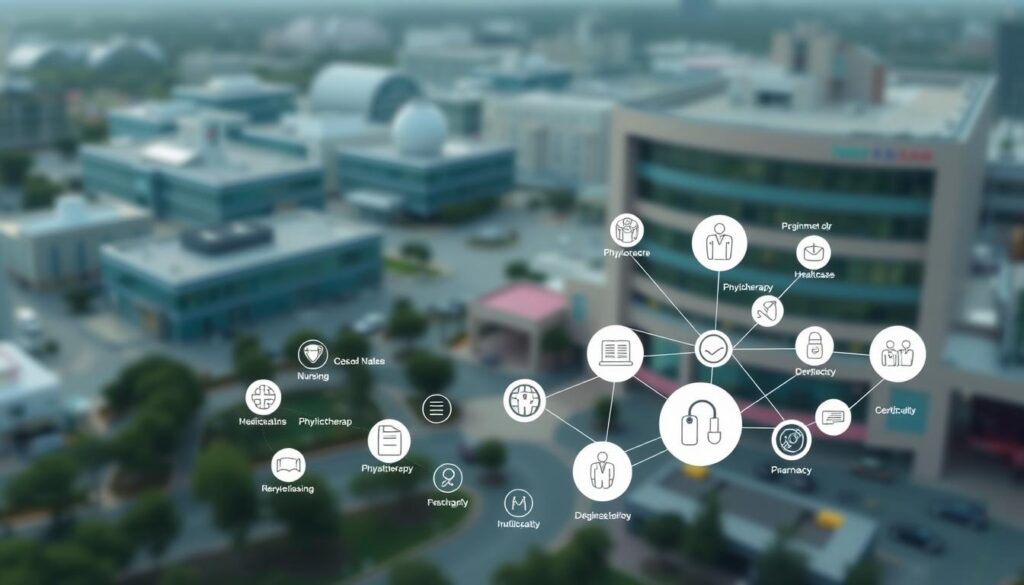The UK’s healthcare system is facing an unprecedented demand for skilled professionals, with both the NHS and private sector offering a multitude of opportunities for those looking to make a difference.
As the backbone of the UK’s healthcare system, NHS professionals play a vital role in delivering high-quality patient care. Meanwhile, the private sector is also experiencing significant growth, with numerous opportunities emerging for healthcare specialists.
The need for dedicated healthcare professionals has never been more pressing, with the UK’s ageing population and increasing healthcare demands driving the requirement for skilled workers.
Key Takeaways
- The UK’s healthcare system is facing significant demand for skilled professionals.
- Both NHS and private sector offer numerous opportunities for healthcare professionals.
- NHS professionals play a vital role in delivering high-quality patient care.
- The private sector is experiencing significant growth, with emerging opportunities for healthcare specialists.
- The UK’s ageing population is driving the need for skilled healthcare workers.
The UK Healthcare Landscape in 2024
In 2024, the UK healthcare sector is characterised by its complex interplay between public and private providers. The National Health Service (NHS) remains a cornerstone of the UK’s healthcare system, providing comprehensive care to millions.
NHS Structure and Current Priorities
The NHS is structured into several key components, including NHS England, NHS Improvement, and Clinical Commissioning Groups (CCGs). Currently, the NHS is prioritising reducing waiting lists, improving mental health services, and enhancing primary care.
Key priorities include:
- Reducing waiting times for elective procedures
- Improving access to mental health services
- Enhancing primary care through increased funding and resources
Private Healthcare Sector Growth Areas
The private healthcare sector in the UK is experiencing growth, driven by increasing demand for private medical insurance and specialised services. Key growth areas include:
- Cancer treatment and diagnostics
- Orthopaedic and musculoskeletal services
- Fertility and reproductive health services
As the private sector expands, it is likely to have a significant impact on the overall UK healthcare landscape, potentially influencing NHS services and policies.
Healthcare Heroes Needed: Understanding the Staffing Crisis
Understanding the staffing crisis in UK healthcare requires examining several key challenges that have converged to create a perfect storm.
Post-Pandemic Recovery Challenges
The COVID-19 pandemic has left a lasting impact on the UK healthcare system, with staff burnout and exhaustion being significant concerns. The NHS has reported increased staff absences due to stress and mental health issues. Recruitment and retention of healthcare professionals have become even more challenging.
“The pandemic has accelerated the existing staffing crisis in the NHS, highlighting the need for sustainable solutions to support our healthcare workforce.” – A healthcare professional
Demographic Pressures on Services
The UK’s ageing population is putting additional pressure on healthcare services, increasing demand for care and requiring more healthcare professionals. The demographic shift necessitates a corresponding shift in workforce planning.
| Age Group | Population (millions) | Healthcare Demand |
|---|---|---|
| 65-74 | 6.5 | Moderate |
| 75-84 | 4.2 | High |
| 85+ | 2.5 | Very High |
Brexit Impact on Healthcare Workforce
The UK’s departure from the EU has affected the flow of healthcare professionals into the UK. Many EU nationals have left or are considering leaving the NHS, exacerbating staffing shortages. Efforts to recruit from non-EU countries are ongoing, but challenges persist.

The staffing crisis in UK healthcare is a multifaceted issue requiring a comprehensive response. Addressing post-pandemic recovery, demographic pressures, and the impact of Brexit will be crucial to ensuring the long-term sustainability of the healthcare system.
Essential Qualities for Success in Healthcare
Success in healthcare requires more than just medical knowledge; it demands a specific set of personal attributes. Healthcare professionals must be equipped with a range of skills and qualities to provide high-quality care and navigate the challenges of the healthcare environment.
Compassion and Emotional Intelligence
Compassion and emotional intelligence are crucial for healthcare professionals. Compassion enables them to empathize with patients and provide empathetic care, while emotional intelligence helps them understand and manage their own emotions and those of their patients.
Resilience and Stress Management
The healthcare environment can be highly stressful, making resilience and stress management essential qualities. Healthcare professionals need to be able to cope with the demands of their role and maintain their well-being.
Effective Communication Skills
Effective communication is vital in healthcare, ensuring that patients receive appropriate care and that healthcare teams work effectively together. This involves verbal and non-verbal communication, as well as written communication.
| Essential Quality | Description | Importance in Healthcare |
|---|---|---|
| Compassion | Empathy and care for patients | High |
| Emotional Intelligence | Understanding and managing emotions | High |
| Resilience | Coping with stress and demands | High |
| Effective Communication | Clear and appropriate communication | High |
In-Demand Clinical Roles and How to Pursue Them
With the NHS and private sector expanding, the need for qualified healthcare professionals has never been more pressing. The UK healthcare landscape is evolving, driven by demographic changes and an increased focus on healthcare delivery.
Nursing Pathways
Nursing is a cornerstone of healthcare, with various specialisms offering rewarding career paths. Nurses are essential in delivering high-quality patient care across different settings.
Adult, Children’s, Mental Health and Learning Disability Nursing
These nursing specialisms cater to diverse patient needs, from adult care to specialized fields like mental health and learning disabilities. Specialized training is required for these roles, ensuring that nurses are equipped to provide compassionate and effective care.
Specialist and Advanced Practice Nursing
Advanced practice nursing involves extended roles that require further education and training, enabling nurses to take on more complex responsibilities and leadership positions.
Medical Careers
Medical careers encompass a broad range of roles, from hospital doctors to general practitioners. These professionals are crucial in diagnosing and treating patients.
Hospital Doctors and Consultants
Hospital doctors and consultants play a vital role in acute care settings, requiring specialized knowledge and expertise. Their work involves complex decision-making and leadership.
General Practice and Community Medicine
General practitioners and community medicine specialists focus on preventive care and community health, providing essential services in primary care settings.
Allied Health Professions
Allied health professions include a variety of roles that support patient care and rehabilitation. These professionals work in multidisciplinary teams to deliver comprehensive care.
Physiotherapy, Occupational Therapy and Radiography
These professions involve hands-on patient care, using techniques like physiotherapy and occupational therapy to aid recovery, while radiography professionals use imaging technologies for diagnosis.
Paramedics and Operating Department Practitioners
Paramedics respond to emergency situations, providing critical care outside hospital settings. Operating department practitioners assist in surgical procedures, ensuring safe and effective care.
As stated by the Health Education England, “The future of healthcare depends on the skills and dedication of its workforce.” Pursuing a career in these in-demand clinical roles can be highly rewarding, with opportunities for professional growth and development in both the NHS and private sector.
Non-Clinical Healthcare Opportunities
Beyond clinical positions, the healthcare industry encompasses a wide range of non-clinical opportunities that are crucial for its functioning. Non-clinical roles support the delivery of high-quality patient care and ensure the smooth operation of healthcare services.
Administrative and Support Roles
Administrative and support roles are vital in healthcare settings, providing essential services that enable clinical staff to focus on patient care. These roles include medical secretaries, receptionists, and health records and information management specialists.
Medical Secretaries and Receptionists
Medical secretaries and receptionists are the frontline administrative staff who manage patient interactions, appointments, and records. They play a crucial role in maintaining the flow of information and ensuring that healthcare services run efficiently.
Health Records and Information Management
Health records and information management specialists are responsible for maintaining accurate and confidential patient records. Their work is critical for ensuring that patient information is accessible and secure.
Technical and Facilities Services
Technical and facilities services are essential for maintaining the infrastructure of healthcare facilities. These roles include IT and digital health specialists, as well as estates and facilities management professionals.
IT and Digital Health Specialists
IT and digital health specialists support the development and maintenance of healthcare technology systems, ensuring that digital records and services are secure and efficient.
Estates and Facilities Management
Estates and facilities management professionals oversee the maintenance and operation of healthcare facilities, ensuring that they are safe, clean, and well-maintained.
Healthcare Management and Leadership
Healthcare management and leadership roles are critical for guiding healthcare services and ensuring that they meet the needs of patients. These roles include operational management, project management, and service improvement specialists.
Operational Management Roles
Operational management roles involve overseeing the day-to-day activities of healthcare services, ensuring that they are delivered efficiently and effectively.
Project Management and Service Improvement
Project management and service improvement specialists work on initiatives to enhance healthcare services, implementing changes that improve patient care and operational efficiency.
As highlighted by a healthcare professional, “The diversity of non-clinical roles in healthcare means that there are opportunities for everyone, regardless of their background or skills.” This diversity is a significant advantage, allowing individuals to contribute to healthcare in meaningful ways.
Step-by-Step Guide to NHS Career Pathways
The NHS provides a wide range of career options for those looking to make a difference in healthcare. With various roles available, individuals can choose a pathway that suits their skills and interests.
Entry Routes for School Leavers
For school leavers, the NHS offers several entry routes into a fulfilling career. These include:
Apprenticeships and Cadet Schemes
The NHS offers apprenticeships and cadet schemes that combine work experience with formal education, providing a foundation for a successful career.
Healthcare Support Worker Roles
Healthcare support worker roles are another entry point, offering hands-on experience in patient care and support.
Career Progression for Graduates
Graduates can pursue various career paths within the NHS. Opportunities include:
Graduate Management Training Scheme
The Graduate Management Training Scheme is designed for those looking to develop leadership skills in healthcare management.
Clinical Academic Careers
Clinical academic careers combine clinical practice with research and education, offering a challenging and rewarding path.
Advancement for Experienced Professionals
For those already working in the NHS, there are opportunities for advancement. These include:
Specialist and Advanced Practice Roles
Specialist and advanced practice roles allow professionals to deepen their expertise and take on more complex responsibilities.
Leadership and Consultant Positions
Leadership and consultant positions are available for those looking to move into senior roles, shaping healthcare delivery and policy.

The NHS is committed to supporting staff throughout their careers, offering training, development, and progression opportunities. By understanding the available pathways, individuals can make informed decisions about their career journey.
Navigating Private Sector Healthcare Careers
The UK’s private healthcare sector is expanding, creating new opportunities for healthcare professionals. This growth is driven by increasing demand for private healthcare services, resulting in a diverse range of career paths.
Hospital Groups and Independent Providers
Major hospital groups such as BMI, Spire, and Nuffield Health are prominent players in the private healthcare sector. Specialised treatment centres also offer focused care services, providing opportunities for healthcare professionals to work in niche areas.
BMI, Spire, Nuffield Health and Others
These hospital groups operate numerous facilities across the UK, offering a range of services from elective surgeries to diagnostic tests. Careers in these organisations can be rewarding, with opportunities for professional growth.
Specialised Treatment Centres
Specialised treatment centres focus on specific areas of healthcare, such as cancer treatment or orthopaedic surgery. Working in these centres can provide valuable experience and expertise.
Care Sector Opportunities
The care sector is a vital part of the private healthcare industry, encompassing residential care homes and domiciliary care services. Careers in this sector involve providing essential care and support to individuals in need.
Residential Care Homes
Residential care homes offer round-the-clock care to residents, requiring a compassionate and skilled workforce. Careers in residential care homes can be highly rewarding.
Domiciliary Care Services
Domiciliary care services provide care to individuals in their own homes, requiring flexibility and a personalised approach. This area of care offers opportunities for healthcare professionals to make a significant difference in people’s lives.
Commercial Healthcare Organisations
Commercial healthcare organisations, including pharmaceutical and medical device companies, as well as health insurance and occupational health providers, play a crucial role in the private healthcare sector. Careers in these organisations can involve sales, marketing, and healthcare consultancy.
Pharmaceutical and Medical Device Companies
These companies develop and market healthcare products, requiring professionals with a background in science, sales, and marketing. Careers in this area can be challenging and rewarding.
Health Insurance and Occupational Health
Health insurance companies and occupational health providers offer services that support workplace health and wellbeing. Careers in these areas can involve risk management, health promotion, and employee wellbeing initiatives.
Qualification Routes into Healthcare Professions
Understanding the qualification requirements for healthcare careers is crucial for aspiring professionals. The UK healthcare sector offers a range of career paths, from clinical roles to administrative positions, each with its own set of qualification requirements.
University Degrees and Professional Registration
Many healthcare careers require a university degree, particularly clinical roles such as nursing and medicine. These degrees often lead to professional registration with bodies like the Nursing and Midwifery Council (NMC) or the General Medical Council (GMC).
Undergraduate Programmes
Undergraduate programmes in healthcare-related fields provide a foundation for various careers. For example, a Bachelor’s degree in Nursing or Medicine is essential for those wishing to become registered nurses or doctors.
Postgraduate Conversion Courses
Postgraduate conversion courses are available for those who wish to change their career path or specialize further. For instance, a postgraduate diploma in a specific area of healthcare can enhance career prospects.
Vocational Qualifications and Work-Based Learning
Vocational qualifications offer an alternative route into healthcare, focusing on practical skills and work-based learning. These qualifications are often available in areas such as healthcare support services.
NVQs and BTECs
National Vocational Qualifications (NVQs) and Business and Technology Education Council (BTEC) qualifications are examples of vocational qualifications that can lead to roles in healthcare.
T-Levels and Healthcare Apprenticeships
T-Levels and healthcare apprenticeships combine classroom learning with on-the-job training, providing a comprehensive introduction to healthcare careers.

Continuing Professional Development Requirements
Continuing Professional Development (CPD) is essential for healthcare professionals to maintain their skills and registration. CPD requirements vary by profession but often include mandatory training and specialist courses.
Mandatory Training and Revalidation
Mandatory training, such as safeguarding and infection control, is required regularly. Professionals must also revalidate their registration periodically, demonstrating their continued competence.
Specialist Courses and Certifications
Specialist courses and certifications can enhance career prospects and provide advanced skills. Examples include certifications in specific clinical procedures or healthcare management.
Practical Guide to NHS Applications
Navigating the NHS application process can be daunting, but with the right guidance, candidates can improve their chances of success. The NHS Jobs website is the primary platform for NHS vacancies, and understanding how to effectively use it is crucial.
Mastering the NHS Jobs Website
To begin, candidates should create a robust profile on the NHS Jobs website. This involves providing detailed information about their qualifications, experience, and skills.
Creating an Effective Profile
A well-crafted profile is essential for making a strong first impression. It should be concise, clear, and tailored to the specific job being applied for, highlighting relevant qualifications and experience.
Setting Up Job Alerts and Tracking Applications
Setting up job alerts allows candidates to stay informed about new vacancies that match their criteria. It’s also important to track the status of applications to ensure timely follow-ups.
NHS Interview Preparation
Preparation is key to acing an NHS interview. This includes understanding the format of the interview, which often includes values-based questions and clinical scenarios.
Values-Based Interview Questions
Values-based questions assess a candidate’s alignment with the NHS values. Candidates should prepare examples that demonstrate their compassion, respect for others, and commitment to improving the lives of patients.
Clinical Scenarios and Assessments
Clinical scenarios test a candidate’s ability to apply their knowledge and skills in practical situations. Practicing with sample scenarios can help build confidence and competence.
| Interview Preparation Tips | Description |
|---|---|
| Research the NHS and the role | Understand the NHS values and the specific requirements of the job |
| Practice common interview questions | Prepare answers to values-based and clinical scenario questions |
| Review your application | Be ready to discuss your qualifications and experience |
How to Secure Private Healthcare Positions
To succeed in the competitive private healthcare job market, one must employ effective job search strategies. The private healthcare sector is rapidly evolving, with numerous opportunities emerging in various areas.
Effective Job Search Strategies
Utilizing the right job search strategies is crucial for landing a position in private healthcare. This involves:
- Identifying the right job boards and recruitment websites
- Networking with professionals in the field
- Engaging with specialist recruitment agencies
Specialist Recruitment Agencies
Specialist recruitment agencies play a vital role in matching healthcare professionals with private sector opportunities. They offer expertise in specific areas, such as nursing, medical careers, and allied health professions.
Networking and Professional Bodies
Networking and being part of professional bodies can significantly enhance job prospects. It provides opportunities for professional development and access to job listings not publicly advertised.
Tailoring Applications for Private Employers
When applying for private healthcare positions, it’s essential to tailor your application materials. This includes:
- Optimizing your CV and cover letter for the specific job
- Demonstrating commercial awareness and understanding of the private healthcare sector
CV and Cover Letter Optimisation
Optimizing your CV and cover letter involves highlighting relevant experience and skills that align with the job requirements. Using keywords from the job description can improve visibility to applicant tracking systems.
Commercial Awareness Development
Developing commercial awareness is critical for success in private healthcare. This involves understanding the business aspects of healthcare delivery and being able to contribute to the organization’s goals.

Financial Support for Healthcare Education
Aspiring healthcare professionals can now access various forms of financial support to facilitate their education and training. The UK healthcare sector offers numerous opportunities for individuals to pursue rewarding careers, and financial assistance is a crucial factor in making these opportunities more accessible.
The financial support available for healthcare education is diverse, catering to different needs and career stages. Two primary sources of financial support are the NHS Learning Support Fund and employer-sponsored education.
NHS Learning Support Fund
The NHS Learning Support Fund is a significant initiative aimed at supporting students pursuing healthcare-related courses. This fund provides financial assistance to help students cover their educational expenses.
Training Grants and Placement Expenses
One component of the NHS Learning Support Fund is training grants, which are designed to help students with the costs associated with their placements and educational materials. These grants can significantly reduce the financial burden on students.
Exceptional Support Funds
In addition to training grants, the NHS Learning Support Fund also offers exceptional support funds for students facing financial difficulties due to unforeseen circumstances. These funds provide critical assistance during challenging times.
Employer-Sponsored Education
Employer-sponsored education is another vital source of financial support for healthcare professionals. Many NHS trusts and private sector employers offer funding or sponsorship for further education and professional development.
NHS Trusts’ Funding Schemes
NHS trusts often have their own funding schemes to support the ongoing education and training of their staff. These schemes can include tuition fee reimbursement, study leave support, and other forms of financial assistance.
“Investing in our staff’s education is crucial for delivering high-quality patient care and advancing our services.” –
Private Sector Sponsorship Opportunities
The private healthcare sector also offers sponsorship opportunities for employees looking to enhance their skills and qualifications. These opportunities can range from full tuition sponsorship to support for professional certifications.
In conclusion, financial support for healthcare education is readily available through various channels, including the NHS Learning Support Fund and employer-sponsored education. These initiatives play a crucial role in fostering a skilled and dedicated healthcare workforce.
Achieving Work-Life Balance in Healthcare
Healthcare workers in the NHS and private sector face unique challenges that require a balance between work and personal life. Achieving a healthy work-life balance is crucial for maintaining their wellbeing and delivering high-quality patient care.

Flexible Working Options
The NHS and private healthcare providers are increasingly offering flexible working arrangements to support staff wellbeing. These options help healthcare professionals manage their work and personal responsibilities more effectively.
Part-Time and Job-Share Arrangements
Part-time and job-share arrangements allow healthcare staff to work reduced hours or share responsibilities with colleagues. This flexibility can help reduce burnout and improve job satisfaction.
Compressed Hours and Annualised Contracts
Compressed hours enable staff to work their full-time hours in fewer days, while annualised contracts allow for more flexible scheduling over the year. These arrangements can provide more control over work schedules and improve work-life balance.
Wellbeing Support Services
In addition to flexible working options, the NHS and private healthcare providers offer various wellbeing support services. These resources are designed to promote staff mental health and overall wellbeing.
NHS Staff Mental Health Resources
The NHS provides dedicated mental health resources for staff, including access to counselling services and mental health support teams. These resources help healthcare professionals manage stress and maintain their mental wellbeing.
Professional Support Networks
Professional support networks offer a safe space for healthcare staff to share experiences, seek advice, and connect with colleagues. These networks play a vital role in promoting staff wellbeing and resilience.
Overcoming Healthcare Career Challenges
Both NHS and private sector healthcare professionals encounter a range of career challenges that require effective management strategies. These challenges can impact their well-being and job satisfaction, ultimately affecting the quality of care provided.
Managing Emotional and Physical Demands
Healthcare professionals often face high emotional and physical demands. The nature of their work exposes them to traumatic situations, long hours, and heavy workloads.
Self-Care Strategies
Implementing self-care strategies is crucial. This includes regular exercise, healthy eating, and adequate rest. By prioritizing their well-being, healthcare professionals can better manage the stresses of their role.
Preventing Burnout
Preventing burnout is also vital. Recognizing early signs such as chronic fatigue and cynicism allows professionals to take proactive measures, including seeking support and taking regular breaks.
Addressing Workplace Pressures
Workplace pressures are another significant challenge. These can stem from staffing shortages, bureaucratic tasks, and complex patient needs.
Time Management Techniques
Effective time management techniques can help alleviate some of these pressures. Prioritizing tasks, delegating when possible, and minimizing distractions can improve productivity.
Conflict Resolution Skills
Developing conflict resolution skills is also essential. By addressing conflicts promptly and professionally, healthcare professionals can maintain a positive work environment.
By understanding and addressing these challenges, healthcare professionals in both the NHS and private sectors can improve their resilience and job satisfaction, ultimately enhancing patient care.
Guide for International Healthcare Professionals
International healthcare professionals are vital to the UK’s NHS and private healthcare sectors. As the demand for healthcare services continues to grow, the UK is increasingly reliant on skilled professionals from around the world to fill critical roles.
Registration and Visa Requirements
To work in the UK healthcare system, international professionals must meet specific registration and visa requirements. This involves registering with the relevant professional body and obtaining a visa that permits them to work in the UK.
Professional Registration Bodies
The main registration bodies for healthcare professionals in the UK include the Nursing and Midwifery Council (NMC) and the General Medical Council (GMC). These bodies ensure that professionals meet the necessary standards to practice in the UK.
Health and Care Worker Visa Process
The Health and Care Worker visa is a key route for international healthcare professionals to work in the UK. This visa category is designed to attract skilled workers to the NHS and adult social care sector. Applicants must have a job offer from an approved employer and meet the required salary threshold.
Adaptation to UK Healthcare Practice
Once registered and with the appropriate visa, international healthcare professionals must adapt to the UK healthcare practice. This includes understanding the NHS’s operational procedures, cultural nuances, and clinical guidelines.
Overseas Nurses Programme
The Overseas Nurses Programme is designed to support international nurses in their transition to working in the UK. The programme provides guidance on registration, visa applications, and adapting to the UK healthcare environment.
Language Requirements and Support
International healthcare professionals must demonstrate proficiency in English to work in the UK. The International English Language Testing System (IELTS) is commonly used to assess language proficiency. Support services are available to help professionals improve their language skills and integrate into the UK healthcare system.
| Registration Requirement | Description | Responsible Body |
|---|---|---|
| Nursing Registration | Registration with the NMC to practice as a nurse in the UK | Nursing and Midwifery Council (NMC) |
| Medical Registration | Registration with the GMC to practice as a doctor in the UK | General Medical Council (GMC) |
| Visa Application | Application for a Health and Care Worker visa | UK Visas and Immigration |
Emerging Healthcare Career Opportunities
Emerging healthcare career opportunities are transforming the NHS and private sector landscapes. The healthcare industry is constantly evolving, driven by technological advancements, changing patient needs, and shifting policy landscapes.
Digital Health and Informatics Roles
The integration of technology in healthcare has given rise to new career paths in digital health and informatics. These roles focus on improving patient care through better data management and technology solutions.
Clinical Informatics Specialists
Clinical informatics specialists design and implement healthcare information systems, ensuring that technology meets clinical needs. They work closely with healthcare professionals to improve patient outcomes.
Health Data Analysts
Health data analysts interpret complex healthcare data to inform decision-making and improve service delivery. Their work is crucial in identifying trends and areas for improvement.
Integrated Care System Positions
Integrated care systems aim to bring together healthcare providers to deliver coordinated care. New roles have emerged to support this initiative, focusing on population health and care coordination.
Population Health Managers
Population health managers oversee the health needs of specific populations, developing strategies to improve health outcomes and reduce inequalities.
Care Coordinators and Link Workers
Care coordinators and link workers play a vital role in ensuring that patients receive seamless care, connecting them with the right services and support.
Specialised and Advanced Practice
The healthcare sector is also seeing a growth in specialised and advanced practice roles, which require advanced skills and qualifications.
Advanced Clinical Practitioners
Advanced clinical practitioners work at a high level of practice, often taking on roles that were previously the domain of doctors. They provide expert care and support to patients.
Physician Associates and Nursing Associates
Physician associates and nursing associates are emerging as key roles in the healthcare workforce, providing medical and nursing care under the supervision of senior healthcare professionals.
| Role | Description | Key Skills |
|---|---|---|
| Clinical Informatics Specialists | Design and implement healthcare information systems | Technical expertise, clinical knowledge |
| Health Data Analysts | Interpret complex healthcare data | Analytical skills, data interpretation |
| Population Health Managers | Oversee health needs of specific populations | Strategic planning, health improvement |
Conclusion: Taking Your First Steps into Healthcare
Embarking on a healthcare career can be a rewarding and challenging journey. The UK’s healthcare landscape offers numerous opportunities in both the NHS and private sector. With a growing demand for healthcare services, individuals can choose from a range of roles, from clinical positions to non-clinical support staff.
The NHS and private sector opportunities provide a diverse range of career pathways. Whether you’re just starting out or looking to progress your career, there are various routes to explore. By understanding the essential qualities required for success in healthcare and the qualifications needed, individuals can make informed decisions about their career choices.
As the healthcare sector continues to evolve, it’s an exciting time to join the profession. With the right training and support, individuals can make a real difference in people’s lives. Take the first step towards a fulfilling healthcare career today, and discover the many opportunities available in the NHS and private sector.
FAQ
What are the main differences between working in the NHS and the private healthcare sector?
The NHS is a publicly funded healthcare system, whereas the private healthcare sector is funded through private insurance and out-of-pocket payments. Working in the NHS often involves a more structured career path, while the private sector may offer more flexibility and varied working arrangements.
What qualifications do I need to work in healthcare?
Qualifications for healthcare roles vary depending on the specific job. For clinical roles, you’ll typically need a relevant degree and professional registration, such as with the Nursing and Midwifery Council or the General Medical Council. Non-clinical roles may require vocational qualifications or diplomas.
How do I get started in a healthcare career?
You can start by exploring different roles and career paths, and researching the required qualifications and training. You can also gain experience through volunteering or work experience placements. Many healthcare organisations, including the NHS, offer apprenticeships and graduate schemes.
What support is available for continuing professional development in healthcare?
Healthcare professionals can access various forms of continuing professional development, including training courses, workshops, and conferences. Many employers, including NHS trusts, offer funding and support for ongoing education and training. Professional bodies, such as the Royal Colleges, also provide resources and guidance.
How can I achieve a better work-life balance in a demanding healthcare role?
Achieving a better work-life balance in healthcare involves prioritising self-care, setting boundaries, and seeking support from colleagues, managers, and professional networks. Flexible working arrangements, such as part-time or job-share roles, can also help. Many healthcare organisations now offer wellbeing support services and resources.
What are the emerging trends and opportunities in healthcare careers?
Emerging trends in healthcare include the growth of digital health, integrated care systems, and specialised and advanced practice roles. New technologies, such as artificial intelligence and telehealth, are creating new career opportunities. Healthcare professionals can also move into leadership, management, and consultancy roles.
How do I secure a job in the private healthcare sector?
To secure a job in the private healthcare sector, you can search for vacancies on job boards, such as NHS Jobs or specialist recruitment agencies. Networking with professionals in the industry and building a strong CV and cover letter can also help. Consider registering with professional bodies, such as the Independent Healthcare Association.
What financial support is available for healthcare education and training?
Financial support for healthcare education and training includes the NHS Learning Support Fund, which provides funding for tuition fees and living costs. Employer-sponsored education and training programmes are also available, as well as sponsorship opportunities from private sector organisations.

